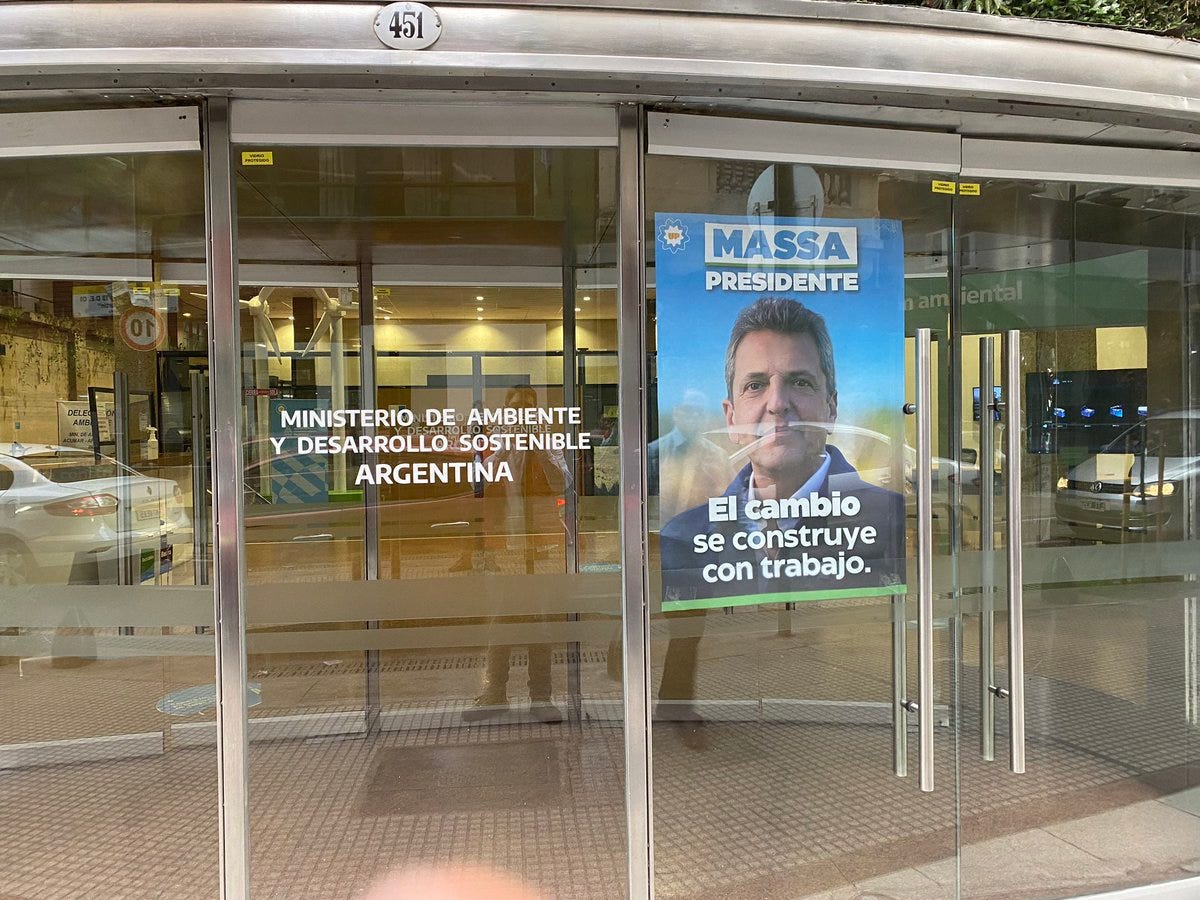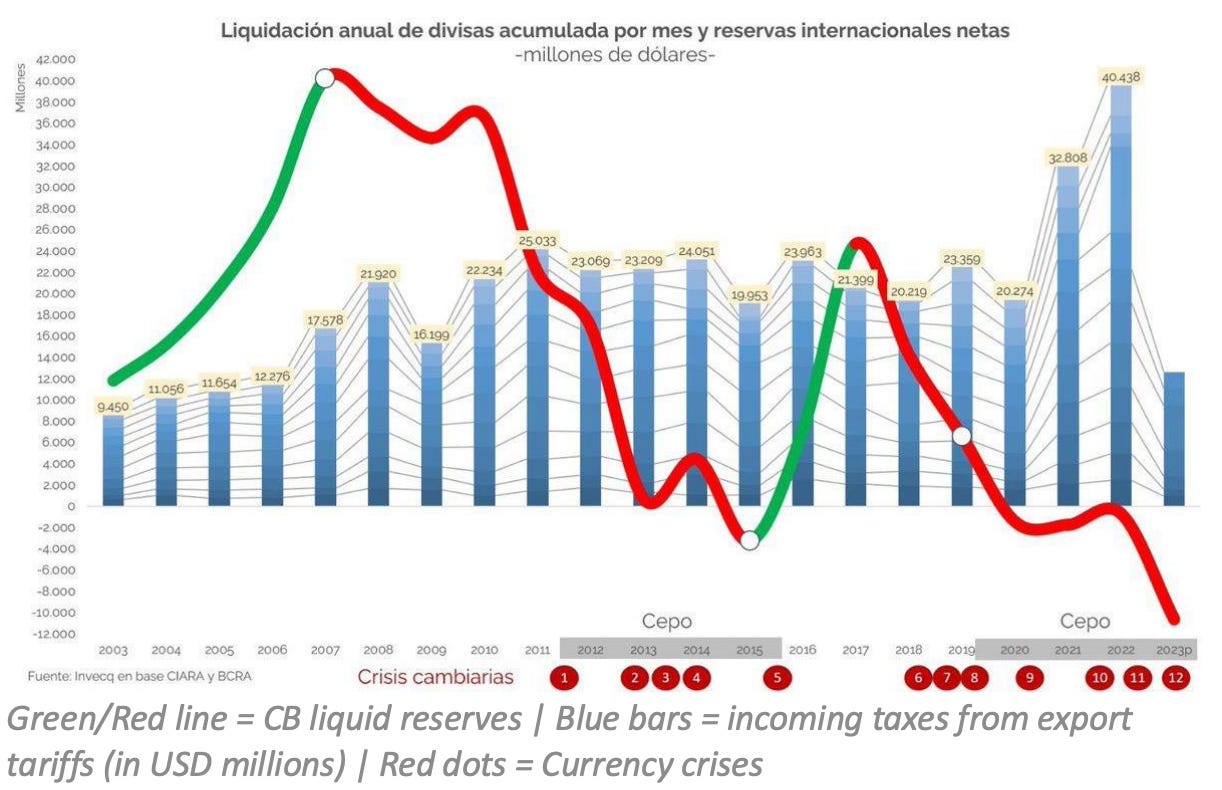The Milei Starter Pack
An overview of the current economic challenges, governability for Milei and more.
Welcome Avatar! Just days ago, few suspected that Argentina would be the first country electing an outspoken Austrian economist and libertarian candidate such as Milei. A pleasant surprise for many, that represents one of the last chances for Argentina to get its ducks in a row. Let’s dive into the cards dealt by the current administration, and how Milei will possibly deal with them.
Much against my own expectations, Milei became president with the most votes ever on Sunday (not in percentages, but in number of votes).
In the seconds after the news became public knowledge when Sergio Massa admitted his defeat, it was hard to find a social media account not talking about Milei.
Milei’s very eccentric nature as a chainsaw slinger reminds of the media attention seen around people like Trump in the US and Bolsonaro in Brazil. Just like with most “current thing” experts, suddenly everyone on social media had been discussing Argie politics for years.
Furthermore, the tinfoil hats on social media did not disappoint with ample shares of Milei’s profile on the World Ecommunist Forum site, denouncing “he is a WEF member, bro!”.
It became so ridiculous that this Patagonian rodent decided to publish Milei’s talk at the WEF in 2014, so keyboard detectives could rest assured and understand why uncle Klaus never invited him again, lol.
Milei’s Meteoric Rise
Milei’s ascent into politics has been nothing short of legendary. As an Austrian economist, he used to be invited on panels on TV shows and got much of his fame from his spicy comments on the economic decisions by previous governments.
In 2020 he decided to run for office, and was elected for the House, and he decided to run for president a year later.
So within no more than 3 years in office and virtually no political experience, Milei became the first economist to be elected president in the history of Argentina.
The fact that he had to overcome the powers that be to make that happen and how he accomplished this with practically zero funding, really is nothing short of Netflix material.
During the whole campaign we saw the State apparatus campaigning against him, and even though institutions are supposed to remain impartial, that didn’t seem to matter.
Next to this, China was willing to lend a helping hand with much of the online fear campaign for Massa being paid from Hong Kong agency accounts. If Milei would win the elections organs would be for sale on Mercadolibre and kids strapped with assault rifles would start shooting up their schools!
This kind of messaging was everywhere online, and in public buildings the fear campaign focused more on the austerity, closing of Ministries and public employment job loss that would ensue after a Milei win.
President Lula da Silva from Brazil was also willing to chip in to make sure Massa would be elected as Alberto Fernández’s successor:

In the week before the election his team made sure to send letters with death threats to multiple leftwing politicians, supposedly coming from Milei’s followers, except no one bought into them since the phrase structure and vocabulary was mostly in Portuguese.
Guess Lula’s team thought paying a translator or using Google translate was too much effort.

The Brazilian marketing coaches were also assembled during the final debate to make sure Massa would crush Milei on TV.
And in the first half of the debate, it did look like Milei was getting crushed. Massa was the experienced politician that kept hammering on Milei’s proposals (and lying about his own numbers), without ever presenting a single proposal for dealing with the current economic situation.
Many people watching the debate including me, got frustrated with the fact that Milei wasn’t given the opportunity to question Massa on his decisions as Minister of Economy.
But much to everyone’s surprise, with the election results it seems people were tired of the smoothly lying and aggressive politician and were more receptive to Milei, who was pushed into a corner by Massa continuously and came across as “the average citizen dealing with politicians”.
With that prelude out of the way, it’s time to go over the laundry list of economic issues that the Milei admin has to deal with in the very near future.
Economic Situation
Milei will inherit one of the most complicated economic situations in Argentina in several decades. I know, Argentina tends to have its problems economically, but the ones its facing now are of such epic proportions that it will prove to be a tough challenge to climb out of the current crater. Let’s run some numbers.
Inflation
In his speech admitting defeat on Sunday, Sergio Massa said that “everything that happens tomorrow is on Milei.”
His followers applauded in agreement as Sergio “Pontius Pilate” Massa washed his hands and added that he was also going to take some time off (translation: fuck this shit, I’m out).

Coming out of Peronist Narnia into the real world, what happens fiscally and monetarily in 2024 will still be the legacy of Sergio Massa, and inflation will likely move towards the 400-500% YoY mark due to inertia.
Argentina is now experiencing double-digit monthly and 150-200% annual inflation, with complete price distortion across the board. The inflationary dynamics are similar to those of the Rodrigazo in 1975.
High inflation will be around for a longer time than most expect. If Milei solves the Leliqs peso bond issue on day 1, it will take at least 6 months before inflation comes down, combined with repressed inflation that will be released once all price controls are taken off.
Back in 1989 during the Plan Bonex restructuring of a similar debt monster denominated in local currency, it took Menem almost 2 years to get fully rid of inflation, even after pegging the peso to the dollar 1:1 and having defaulted on those peso bonds.
Fiscal Deficit
The current fiscal deficit is at -5.8%, and as you can tell from this graph, there have only been a handful of years where Argentina actually ran a surplus:

This is one of the first things Milei wants to solve. Public spending is at historically high levels, and he will have to bring them down in order to create a more stable economy.

Reserves - What Reserves?
The current administration has always maintained its management of the economy could not be criticized because of “Macri, the IMF, the pandemic, the war, the drought” and a myriad of other lame excuses in order to avoid taking responsibility for the economic abyss it created.
In terms of accountability, during the 2019-2023 despite the drought, the IMF, Macri and whatever other excuse the Alberto Fernández/Massa administration came up with, there was a RECORD influx of tariffs on exports, and it all went poof:
After the initial meeting with the current administration, Milei’s team has already confirmed the coffers are beyond empty. Exactly how much more empty is something that will be unveiled in the upcoming weeks, but the official numbers are negative net reserves of -$12 billion dollars.
The exchange market is completely distorted with multiple exchange rates, and an exchange gap exceeding 150% between the official exchange rate and the market rate (blue dollar rate).
Government Debt
Argentina’s government debt is now at record levels, exceeding $419 billion. The external market is completely closed and the internal market saturated with domestic debt all indexed.
During this presidency, government debt increased by almost 30% in USD. That’s a lot for a country that can’t print dollars.
IMF
Even though the Alberto Fernández administration blamed the IMF for its financial woes, the truth of the matter is that Minister Sergio Massa never followed the IMF guidelines and objectives, and the interest paid so far is a drop in the bucket ($2-3 billion USD).
The IMF maturities for Argentina will only start from 2026 onwards, so there Milei has some time to organize the economy first:
The Peso Ponzi (Leliqs)
The monetary policy interest rate at 133% APY (250% APR), with paid liabilities (Leliqs) exceeding $23 trillion pesos, grow more than $2 trillion per month and already exceed 10% of GDP.
These Leliqs are held by local banks and businesses (for payroll etc), so it is imperative to make sure Argentina does not default on this in order to avoid an avalanche of bankruptcies and layoffs in the local economy.
Positive is that after winning the elections, Milei directly announced his plans to unwind the Leliqs peso Ponzi the very next day.
He is looking to secure $30 billion USD in order to bailout the Leliq holders and terminate the ponzi that is currently generating an additional monetary base every 1.5 months in interest alone.
Another positive sign is that the banks only renewed 40% of the Leliqs that expired this week.
Dollarization
In my Dollarization Scenarios for Argentina article I discussed the different ways Milei’s team could start dollarizing the economy and get rid of the BCRA (Central Bank).
However, in the planning of his term, this would only be introduced during year 2-3, and it is still not clear how Milei would exactly dollarize. One thing he has always stated is that it will not be a mandated dollarization, but the freedom of currency (with the State opting for the US Token).
The idea is that anyone can charge or pay for any service or product in the currency that they want to use. Milei has no official stance on using Bitcoin, —here’s a video of him discussing Bitcoin—, but it’s safe to say that Bitcoin would fit quite nicely in that framework of freedom in choice of currency. If people will actually choose to spend or transact in Bitcoin, that is a whole different conversation.
Trade Deficit
The current trade balance deficit stands at more than $54 billion in debt from importers with foreign suppliers. This is also one of the reasons for the shortages in imported products, medicine, etc.

Trade activity is in decline and accumulates twelve years of structural stagnation and a 15% drop in GDP per capita.
Social Tensions
As I mentioned in the different scenarios in Argentina Elections: The Winner Takes it All, it is very likely that social unrest will increase under Milei’s presidency:
Social groups, unions and syndicates which all respond to Peronist calls for unrest and chaos would paralyze the economy completely in “protest” against Milei.
We can already see that play out with different unions calling for strikes and protests just days after the election results.
It boggles the mind that union leaders et al complain about Milei —who hasn’t even started his government yet—, after being silent for 4 years while the currency devaluated from $40 pesos per dollar to $1,000 per dollar, and securing the #1 spot worldwide for highest real inflation around 200%+ YoY (CPI is 150%, but real inflation is a lot higher than that).
But: this is Argentina after all.
We can expect a lot more turbulence from this segment of society if things do not turn around soon (and as we have seen above, that will probably not happen before 2025).
The important question is if people will have the patience and understanding to sit out the pain of 2024. My gut says that’s probably too much to ask for most who are now living in poverty (40%+).
Governability
In an excellent article around the current political power structure in Argentina published by FT, the potential issues Milei could face in terms of governability are laid bare:
LLA has just 38 seats in Argentina’s lower house, and seven in the senate, so Milei will need the votes that Macri has promised will come from the PRO — though no formal coalition has been announced. But that would still only amount to a third of seats in the lower house and a fifth in the senate.
Milei’s government may thus struggle, with or without Macri, to deliver the comprehensive reform that most economists say is needed to stabilise and eventually revive Argentina’s spiralling economy.

For tax reforms, he will need to pass those through the Senate. That is just one example, but there are many more cases in which a simple DNU (presidential decree) won’t suffice.
In terms of real power, the Peronista coalition holds 33 of 72 Senate seats and 108 of 257 House seats. Milei’s party holds 7 Senate seats and 38 seats in the House:

Milei will have to govern by coalition and needs Juntos por el Cambio (JxC) to push things through (and even then it will be tough in both instances to get a majority, since the smaller socialist parties are more likely to side with the Peronists from Frente de Todos.
Since being faithful is not an essential part of Argentine political DNA, it also means that at the slightest adversity, this coalition can start fracturing.
First things first
It is imperative that the Milei administration focuses on the most important thing first: the economy.
All the rest, except perhaps for security, is secondary and will divert the attention from the main goal, which is that Argentina gets its ducks in a row from an economic perspective.
If Milei is not able to fix it, Peronism/Kirchnerism will come back with a vengeance to “clean up Milei’s neoliberal mess”. The fact that they originally created that mess means nothing, since voter memories are short lived in Argentina.
This could well be the playbook laid out all along by appointing Massa as the main presidential candidate for the Peronist block.

It is good to see that all of Milei’s proposals are still on the table, and these include privatization of public companies, downsizing the state and cutting and simplifying the tax rates.
Milei also stressed that the number one goal for 2024 is to obtain a fiscal balance at the end of the year. This has historically been one of the hardest things for Argentina to accomplish, let’s see if he can pull it off.
See you in the Jungle, anon!













Another EXCELLENT article. Great analysis and spot on target. There are many unknowns but as I mentioned pretty much since the beginning, dollarization won't happen quickly. It's a long play that I can't see happening any time soon. Why? NO MONEY.
With the strikes and things, he needs to be smart. I already laid out my advice for a 30, 60, 120 180, 360 day plan and roadmap. He needs to publicly get out there that if anyone is striking they don't love Argentina and to give his plan a shot first. He hasn't even started yet.
Society is ready for change there but it won't be easy or quick. More turmoil and as I mentioned, he might regret getting the job. But so far he is making the right decisions.
It’s so reassuring that the pendulum can swing back like this. I really thought the collectivists had total control there for a year or two (worldwide).
Hopefully the wonderful people of Argentina can un-learn state dependence and make something great of this moment. Hilarious meme at the end.